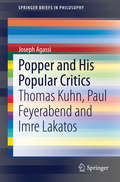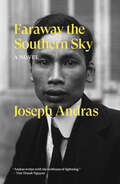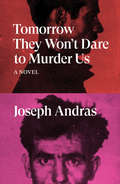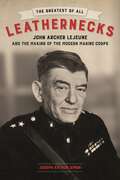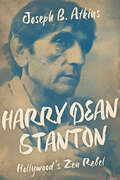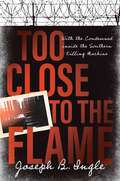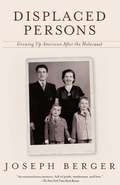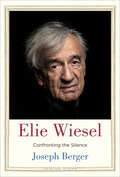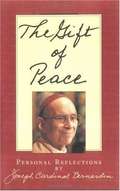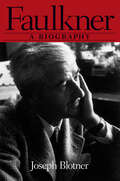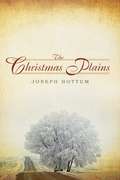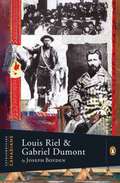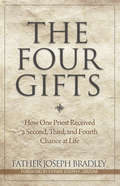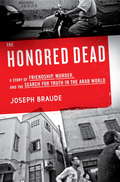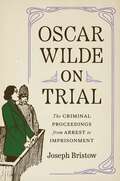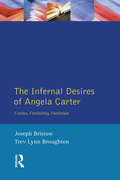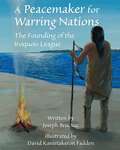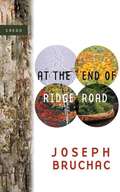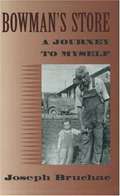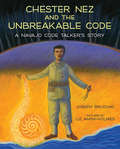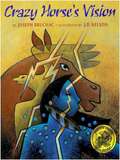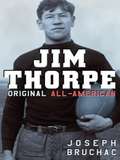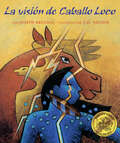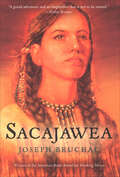- Table View
- List View
Popper and His Popular Critics
by Joseph AgassiThis volume examines Popper's philosophy by analyzing the criticism of his most popular critics: Thomas Kuhn, Paul Feyerabend and Imre Lakatos. They all followed his rejection of the traditional view of science as inductive. Starting from the assumption that Hume's criticism of induction is valid, the book explores the central criticism and objections that these three critics have raised Their objections have met with great success, are significant and deserve paraphrase. One also may consider them reasonable protests against Popper's high standards rather than fundamental criticisms of his philosophy The book starts out with a preliminary discussion of some central background material and essentials of Popper's philosophy. It ends with nutshell representations of the philosophies of Popper. Kuhn, Feyerabend and Lakatos. The middle section of the book presents the connection between these philosophers and explains what their central ideas consists of, what the critical arguments are, how they presented them, and how valid they are. In the process, the author claims that Popper's popular critics used against him arguments that he had invented (and answered) without saying so. They differ from him mainly in that they demanded of all criticism that it should be constructive: do not stop believing a refuted theory unless there is a better alternative to it. Popper hardly ever discussed belief, delegating its study to psychology proper; he usually discussed only objective knowledge, knowledge that is public and thus open to public scrutiny.
Faraway the Southern Sky: A Novel (Verso Fiction)
by Joseph Andras"Joseph Andras writes with the swiftness of lightning."–Viet Thanh Nguyen, author of The SympathizerA biographical historical fiction retelling of Ho Chi Minh's immigration and radical life in underground Paris in the 1920sFleeing persecution in Indochina, the young Ho Chi Minh arrived in Paris as World War I was sputtering to a close. A painfully shy twentysomething who stammered when he spoke in public, he joined the shadowy figures of the demimonde, the radicals, poor artists, prostitutes, the luckless, and rebellious.Six years later, he boarded a train bound for the young Soviet Union as the fiery, passionate leader of the Vietnamese independence movement and a founder of the French Communist Party. He had lived under various pseudonyms in a succession of seedy apartments. There had been arrests and beatings, jobs in restaurants and photo shops, revolutionary writing in the Bibliotheque Nationale, and meetings with Chaplin and Colette, all while being dogged by French spies—much of what we know about the young man&’s Paris years is thanks to that surveillance, down to accounts of arguments he had with friends at home.Searching for traces of the past in the streets of today, Joseph Andras hears echoes of other angry histories, from terror attacks to tent encampments to the protests of the Gilets jaunes. This intensely lyrical, genre-bending book is a meditation on what could be called the grandeur of the poor, the free, the outcast, and the rebellious—people who might not find a place in history books but without whom history could not be written.
Tomorrow They Won't Dare to Murder Us: A Novel
by Joseph AndrasLyrical and radical, a debut novel that created a sensation in FranceWinner of the Prix Goncourt for first novel, one of the most prestigious literary awards in FranceA young revolutionary plants a bomb in a factory on the outskirts of Algiers during the Algerian War. The bomb is timed to explode after work hours, so no one will be hurt. But the authorities have been watching. He is caught, the bomb is defused, and he is tortured, tried in a day, condemned to death, and thrown into a cell to await the guillotine. A routine event, perhaps, in a brutal conflict that ended the lives of more than a million Muslim Algerians.But what if the militant is a &“pied-noir&”? What if his lover was a member of the French Resistance? What happens to a &“European&” who chooses the side of anti-colonialism?By turns lyrical, meditative, and heart-stoppingly suspenseful, this novel by Joseph Andras, based on a true story, was a literary and political sensation in France, winning the Prix Goncourt for First Novel and being acclaimed by Le Monde as &“vibrantly lyrical and somber&” and by the journal La Croix as a &“masterpiece&”.
The Greatest of All Leathernecks: John Archer Lejeune and the Making of the Modern Marine Corps
by Joseph Arthur SimonJoseph Arthur Simon’s The Greatest of All Leathernecks is the first comprehensive biography of John Archer Lejeune (1867–1942), a Louisiana native and the most innovative and influential leader of the United States Marine Corps in the twentieth century. As commandant of the Marine Corps from 1920 to 1929, Lejeune reorganized, revitalized, and modernized the force by developing its new and permanent mission of amphibious assault. Before that transformation, the corps was a constabulary infantry force used mainly to protect American business interests in the Caribbean, a mission that did not place it as a significant contributor to the United States defense establishment. The son of a plantation owner from Pointe Coupee Parish, Lejeune enrolled at Louisiana State University in 1881, aged fourteen. Three years later, he entered the U.S. Naval Academy, afterward serving for two years at sea as a midshipman. In 1890, he transferred to the Marines, where he ascended quickly in rank. During the Spanish-American War, Lejeune commanded and landed Marines at San Juan, Puerto Rico, to rescue American sympathizers who had been attacked by Spanish troops. A few years later, he arrived with a battalion of Marines at the Isthmus of Panama—part of Colombia at the time—securing it for Panama and making possible the construction of the Panama Canal by the United States. He went on to lead Marine expeditions to Cuba and Veracruz, Mexico. During World War I, Lejeune was promoted to major general and given command of an entire U.S. Army division. After the war, Lejeune became commandant of the Marine Corps, a role he used to develop its new mission of amphibious assault, transforming the corps from an ancillary component of the U.S. military into a vibrant and essential branch. He also created the Marine Corps Reserve, oversaw the corps’s initial use of aviation, and founded the Marine Corps Schools, the intellectual planning center of the corps that currently exists as the Marine Corps University. As Simon masterfully illustrates, the mission and value of the corps today spring largely from the efforts and vision of Lejeune.
Harry Dean Stanton: Hollywood's Zen Rebel (Screen Classics Ser.)
by Joseph B. AtkinsThe first biography of the man Vanity Fair described as “the philosopher poet of character acting.”After a series of minor parts in forgettable westerns, Harry Dean Stanton gradually began to get film roles that showcased his laid-back acting style, appearing in Cool Hand Luke, Kelly’s Heroes, The Godfather: Part II, and Alien. He became a headliner in the eighties?starring in Wim Wenders’s moving Paris, Texas and Alex Cox’s Repo Man?but it was his extraordinary skill as a character actor that established him as a revered cult figure and kept him in demand throughout his career.Here, Joseph B. Atkins unwinds Stanton’s enigmatic persona, shedding light on his early life in West Irvine, Kentucky, and exploring his difficult relationship with his Baptist parents, his service in the Navy, and the events that inspired him to drop out of college and pursue acting. Atkins also chronicles Stanton’s early years in California, describing how he honed his craft at the renowned Pasadena Playhouse before breaking into television and movies.In addition to examining his acclaimed body of work, Atkins explores Harry Dean Stanton as a Hollywood legend, following his years rooming with Jack Nicholson, partying with David Crosby and Mama Cass, jogging with Bob Dylan, and playing poker with John Huston. Stanton is often remembered for his crowd-pleasing roles in movies like Pretty in Pink or Escape from New York, but this impassioned biography illuminates the entirety of his incredible sixty-year career, drawing on interviews with the actor’s friends, family, and colleagues.
Too Close to the Flame: With the Condemned inside the Southern Killing Machine
by Joseph B. IngleJoe Ingle&’s Too Close to the Flame is a heartbreakingly beautiful account of over four decades serving as a spiritual counselor, guide, and friend to the men and women on Death Row. &“I had been working with the condemned since 1975—but never before had an execution affected me with this much power and confusion.&” Throughout his forty-five years visiting death rows across the American South, Joe Ingle has learned, loved, and suffered intensely. In Too Close to the Flame, Ingle describes how the events of 2018–2020 finally exposed the deep wounds inflicted on his psyche by nearly half a century of enduring the state-sanctioned murder of friend after friend. As an advocate for the men and women condemned to death by an unjust legal system that routinely victimizes the marginalized, Ingle has often found himself waiting through the darkest hours as the spiritual advisor and sole companion of those on deathwatch—the brief period of isolation that precedes an execution. In vivid detail and startling candor, Ingle describes every moment with the expertise of a scholar and the affection of a brother. Through Ingle&’s eyes, we are invited into the inner sanctum during desperate attempts at clemency, intimate final hours, and the mourning that follows a night on deathwatch. Part psychological memoir, part history of Southern state killing since the reinstatement of the death penalty in 1976, Too Close to the Flame is above all a catalogue of love—a gallery of relationships that could only be forged between people staring death in the face together. It is an account of the price of radical Christian love, a record of service to the least among us, and a testament to the full humanity of those whom the powers that be would seek to dehumanize and exterminate.
Displaced Persons: Growing Up American After the Holocaust
by Joseph BergerIn this touching account, veteran New York Times reporter Joseph Berger describes how his own family of Polish Jews -- with one son born at the close of World War II and the other in a "displaced persons" camp outside Berlin -- managed against all odds to make a life for themselves in the utterly foreign landscape of post-World War II America. Paying eloquent homage to his parents' extraordinary courage, luck, and hard work while illuminating as never before the experience of 140,000 refugees who came to the United States between 1947 and 1953, Joseph Berger has captured a defining moment in history in a riveting and deeply personal chronicle.
Elie Wiesel: Confronting the Silence (Jewish Lives)
by Joseph BergerAn intimate look at Elie Wiesel, author of the seminal Holocaust memoir Night and recipient of the Nobel Peace Prize As an orphaned survivor and witness to the horrors of Auschwitz, Elie Wiesel (1928–2016) compelled the world to confront the Holocaust with his searing memoir Night. How did this soft-spoken man from a small Carpathian town become such an influential figure on the world stage? Drawing on Wiesel’s prodigious literary output and interviews with his family, friends, scholars, and critics, Joseph Berger seeks to answer this question. Berger explores Wiesel’s Hasidic childhood in Sighet, his postwar years spent rebuilding his life from the ashes in France, his transformation into a Parisian intellectual, his failed attempts at romance, his years scraping together a living in America as a journalist, his decision to marry and have a child, his emergence as a spokesperson for Holocaust survivors and persecuted peoples throughout the world, his lifelong devotion to the state of Israel, and his difficult final years. Through this penetrating portrait we come to know intimately the man the Norwegian Nobel Committee called “a messenger to mankind.&rdquo
The Gift of Peace: Personal Reflections
by Joseph BernardinIn the final two months of his life, Joseph Cardinal Bernardin made it his mission to share his personal reflections and insights in this book, The Gift of Peace. Using as a framework the previous three years, which included false accusation of sexual misconduct, diagnosis of cancer, and return of the cancer after fifteen months of being in remission, Cardinal Bernardin tells his story openly and honestly. At the end of his life, the Cardinal was at peace. He accepted his peace as a gift from God, and through this book, he shares that gift with the world. The Gift of Peace is part of the Cardinal’s pastoral legacy; through this book his ministry lives on.
Faulkner: A Biography (Southern Icons Series #3)
by Joseph BlotnerWilliam Faulkner (1897-1962) remains the pre-eminent literary chronicler of the American South and a giant of American arts and letters. Creatively obsessed with problems of race, identity, power, politics, and family dynamics, he wrote novels, stories, and lectures that continue to shape our understanding of the region's promises and problems. His experiments and inventions in form and style have influenced generations of writers. Originally published in 1974 as a two-volume edition and extensively updated and condensed in a 1991 reissue, Joseph Blotner's Faulkner: A Biography remains the quintessential resource on the Nobel laureate's life and work. The Chicago Tribune said, "This is an overwhelming book, indispensable for anyone interested in the life and works of our greatest contemporary novelist." That invaluable 1991 edition is now back in print.Blotner, a friend and one-time colleague of Faulkner's, brings a vivid, personalized tone to the biography, as well as a sense of masterful, comprehensive scholarship. Using letters, inter-views, reminiscences, critical work, and other primary sources, Blotner creates a detailed and nuanced portrait of Faulkner from his birth to his death. The revision of the original 1974 biography incorporates commentary on the plethora of Faulkner criticism, family memoirs, and posthumously published works that appeared in the wake of the first version. It also examines collections of letters and other materials that only came to light after the original publication.Featuring a detailed chronology of Faulkner's life and a genealogical chart of his family, Faulkner is authoritative and essential both for literary scholars and for anyone wanting to know about the life of one of the nation's foremost authors. Blotner's masterpiece is the template for all biographical work on the acclaimed writer.
The Christmas Plains
by Joseph BottumA well-respected writer and editor's memoir of childhood Christmases set in the sometimes harsh but always captivating landscape of South Dakota.Wreaths and holly, fruitcakes and mistletoe, ornaments and snowflakes, St. Nick and Scrooge's humbug, Joseph and Mary, a young child in a manger and magi from the East. These words automatically stir up the season of Christmas and invoke memories of family and friends and hope and faith. By turns sweet and comic, sentimental and serious, the former editor of First Things magazine shares his reflections of the mad joys and wild emotions of the season while growing up on the South Dakota plains.
Extraordinary Canadians Louis Riel And Gabriel Dumont
by Joseph BoydenLouis Riel is regarded by some as a hero and visionary, by others as a madman and misguided religious zealot. The Métis leader who fought for the rights of his people against an encroaching tide of white settlers helped establish the province of Manitoba before escaping to the United States. Gabriel Dumont was a successful hunter and Métis chief, a man tested by warfare, a pragmatist who differed from the devout Riel. Giller Prize--winning novelist Joseph Boyden argues that Dumont, part of a delegation that had sought out Riel in exile, may not have foreseen the impact on the Métis cause of bringing Riel home. While making rational demands of Sir John A. Macdonald's government, Riel seemed increasingly overtaken by a messianic mission. His execution in 1885 by the Canadian government still reverberates today. Boyden provides fresh, controversial insight into these two seminal Canadian figures and how they shaped the country.
The Four Gifts
by Joseph BradleyBy all rights, Father Joseph Bradley should be dead. If past usage of beer, marijuana, and cocaine didn't do the trick, then certainly heart failure should have. Instead, by the grace of God, he is alive, clean, sober, and a functioning Catholic priest with another man's heart beating in his chest. But it came at a huge cost. While Joe was in his late teens, his father died suddenly. The loss was devastating and Joe's emotional desolation found escapist bliss in a beer bottle and cocaine vial, and he pledged irrevocable devotion to both. The slide into the abyss was ugly, and Joe finally sought help because there was nowhere else to go--which led him to serve others as a Catholic priest. The day of Joe's ordination, an old friend came to the mass and announced for all to hear, "Well, now I can say I've seen a miracle." Joe functioned for fifteen years as a sober priest before his heart gave out from the same heart disease that killed his father. But another miracle came his way, and he was blessed with a new heart--a gracious gift from a family during the most painful moment of their lives. Joe has been granted the blessing of four gifts: faith, sobriety, a new heart, and a fulfilling ministry. As Father Joe says, "Gratitude inspired this book. I owe it to people who helped rescue me from alcohol and drugs, and I owe it to my heart donor for giving me yet another chance at life."
The Honored Dead: A Story of Friendship, Murder, and the Search for Truth in the Arab World
by Joseph BraudeThe Arab Islamic world is known for religious extremism, ethnic conflicts, and, now, the overthrow of seemingly unshakable regimes--but if anything has become clear, it's that our understanding of the region remains shrouded and incomplete. The seeds of revolution, radicalism, and--possibly--reform are buried in the individual stories of millions of people whose lives determine the fates of their societies, people whose motivations are as common, and as strange, as our own.Here is one of those stories--and the story of how this world is being transformed, one life at a time. Joseph Braude is the first Western journalist ever to secure embed status with an Arab security force, assigned to a hardened unit of detectives in Casablanca who handle everything from busting al-Qaeda cells to solving homicides. One day he's given the file for a seemingly commonplace murder: a young guard at a warehouse killed in what appears to be a robbery gone wrong. Braude is intrigued by the details of the case: the sheer brutality of the murder, the identities of the accused--a soldier--and the victim, a shadowy migrant with links to a radical cleric, and the odd location: a warehouse owned by a wealthy member of one of the few thriving Jewish communities in the Arab world. After interviewing the victim's best friend, who tearfully insists that the true story of the murder has been covered up by powerful interests, Braude commits to getting to the bottom of it.Braude's risky pursuit of the shocking truth behind the murder takes him from cosmopolitan Marrakesh to the proud Berber heartland, from the homes of the wealthiest and most powerful people in the country to the backstreets of Casablanca, where migrants come to make fortunes, jihad, and trouble, but often end up just trying to survive with dignity. The Honored Dead is a timely and riveting mystery about a society in transition, the power of the truth, and the irrepressible human need for justice.From the Hardcover edition.
Oscar Wilde on Trial: The Criminal Proceedings, from Arrest to Imprisonment (Yale Law Library Series in Legal History and Reference)
by Joseph BristowThe most authoritative account of a pivotal event in legal and cultural history: the trials of Oscar Wilde on charges of &“gross indecency&” Among the most infamous prosecutions of a literary figure in history, the two trials of Oscar Wilde for committing acts of &“gross indecency&” occurred at the height of his fame. After being found guilty, Wilde spent two years in prison, emerged bankrupt, and died in a cheap hotel room in Paris a few years after his release. The trials prompted a new intolerance toward homosexuality: habits of male bonding that were previously seen as innocent were now viewed as a threat, and an association grew in the public mind between gay men and the arts.Oscar Wilde on Trial assembles accounts from a variety of sources, including official and private letters, newspaper accounts, and previously published (but very incomplete) transcripts, to provide the most accurate and authoritative account to date of events that were pivotal in both legal and cultural history.
The Infernal Desires of Angela Carter: Fiction, Femininity, Feminism (Longman Studies In Twentieth Century Literature)
by Joseph Bristow Trev Lynn BroughtonDrawing on many aspects of contemporary feminist theory, this lively collection of essays assesses Angela Carter's polemical fictions of desire. Carter, renowned for her irreverent wit, was one of the most gifted, subversive, and stylish British writers to emerge in the 1960s.
A Peacemaker for Warring Nations: The Founding of the Iroquois League
by Joseph BruchacThe League of the Iroquois was a true representational democracy—so much so that the United States Constitution is said to have been modeled on some of its tenets. But how, perhaps a thousand years before the time of Columbus, did the Five Iroquois Nations (the Mohawk, Onondaga, Oneida, Cayuga, and Seneca) come to end the bitter eye-for-eye warfare among them? What brought them together in an alliance based on the Great Law of Peace? And how was it that a system of Clan Mothers was instituted in which women are seen as the center of the nation and still today choose the 50 royaners, or peace chiefs, who speak for their respective communities in meetings of the League? In A Peacemaker for Warring Nations, renowned Native author Joseph Bruchac draws from the teachings of both contemporary and past Iroquois tradition bearersin telling the inspiring story of how &“the Peacemaker,&” a divine messenger sent by the Creator, helped to bring reconciliation to warring nations. The book is beautifully and accurately illustrated by David Kanietakeron Fadden, a respected Mohawk artist whose work honors his deep indigenous roots.
At the End of Ridge Road
by Joseph BruchacAt the End of the Ridge Road traces Joseph Bruchac's path from "nature nut" to jock to writer, to his home at the end of Ridge Road near where he was raised by his grandparents. This colorful memoir from one of our best-known Native American writers explores the links between Bruchac's native Abenaki culture and his long-held views on human dignity and social justice." "Asking readers to remove their watches so they might "live time" rather than be ruled by it, Bruchac tells his own story - one that sits at the crossroads of his Abenaki and European heritage. From the foot of Glass Factory Mountain to the halls of Cornell, from a classroom in West Africa to a start-up literary magazine in a room of his grandfather's home, Bruchac superimposes Native American ways of seeing upon the structure of today's world. Bruchac believes the essential wisdom of native cultures, the balance of nature, and the power of a well-told story each holds ways to avoid humanity's most destructive impulses.
Bowman's Store: A Journey to Myself
by Joseph BruchacThe author shares in this memoir how he came to fully understand, and eventually claim, his Native American heritage, despite his grandparents' unspoken pact to never discuss Grandpa's Abenaki blood.
Chester Nez and the Unbreakable Code: A Navajo Code Talker's Story
by Joseph BruchacAs a young Navajo boy, Chester Nez had to leave the reservation and attend boarding school, where he was taught that his native language and culture were useless. But Chester refused to give up his heritage. Years later, during World War II, Chester—and other Navajo men like him—was recruited by the US Marines to use the Navajo language to create an unbreakable military code. Suddenly the language he had been told to forget was needed to fight a war. This powerful picture book biography contains backmatter including a timeline and a portion of the Navajo code, and also depicts the life of an original Navajo code talker while capturing the importance of heritage.
Crazy Horse's Vision (Live Oak Media Ereadalong Ser.)
by Joseph BruchacThe true story of the great Sioux warrior who, as a young boy, defies tradition and seeks a vision on his own in hopes of saving his people.Crazy Horse is among the best known Native American heroes. Yet many people do not know his boyhood name was Curly, inspired by his curly hair. Curly was a leader even as a young boy, taming wild horses and hunting powerful buffalo. But all his bravery could not prepare him for the trouble he and the other Lakota Indians would face with the white settlers. Wanting to help his people after a fierce battle that mortally wounded Chief Conquering Bear, Curly defied traditional custom and risked his own life by running away, up to the hills, to seek a vision. Renowned Abenaki author Joseph Bruchac tells a gripping and compelling story of how the dedicated young boy, Curly, grows into the brave warrior Crazy Horse. Sioux artist S.D. Nelson, with paintings inspired by the ledger book style of the Plains Indians, evokes the drama and tragedy of an important figure in American history.
Jim Thorpe, Original All-American
by Joseph BruchacJim Thorpe was one of the greatest athletes who ever lived. He played professional football and Major League baseball, and won Olympic gold medals in track and field. But his life wasn?t easy. Born on a reservation, he endured family tragedy and was sent to various Native American boarding schools. Jim ran away from school many times, until he found his calling under the now-legendary coach Pop Warner. This is a book for history buffs as well as sports fans?an illuminating and lively read about a truly great American by award-winning author Joseph Bruchac.
La visión de Caballo Loco: (Crazy Horse's Vision)
by Joseph BruchacLa verdadera historia del gran guerrero Sioux que, de joven, desafía la tradición y busca una visión propia con la esperanza de salvar a su pueblo. The true story of the great Sioux warrior who, as a young boy, defies tradition and seeks a vision on his own in hopes of saving his people.Caballo Loco (o Crazy Horse) es uno de los héroes indígenas más conocidos. Sin embargo, mucha gente no sabe que su nombre de niño era Rizos, inspirado por su cabello rizado. Rizos fue un líder incluso cuando era un niño, domaba caballos salvajes y cazaba poderosos búfalos. Pero toda su valentía no pudo prepararlo para los problemas que él y los otros Lakotas enfrentarían con los colonos blancos. Queriendo ayudar a su gente después de una feroz batalla que hirió de muerte al jefe Oso Conquistador, Rizos desafió la costumbre tradicional y arriesgó su propia vida al huir a las colinas en busca de una visión. El renombrado autor abenaki, Joseph Bruchac, cuenta una historia apasionante y convincente de cómo el joven dedicado, Rizos, se convierte en el valiente guerrero Caballo Loco. El artista sioux S.D. Nelson, con pinturas inspiradas en el estilo de libro de contabilidad de pueblos nativos de las llanuras, evoca el drama y la tragedia de una figura importante en la historia estadounidense. Crazy Horse is among the best known Native American heroes. Yet many people do not know his boyhood name was Curly, inspired by his curly hair. Curly was a leader even as a young boy, taming wild horses and hunting powerful buffalo. But all his bravery could not prepare him for the trouble he and the other Lakota Indians would face with the white settlers. Wanting to help his people after a fierce battle that mortally wounded Chief Conquering Bear, Curly defied traditional custom and risked his own life by running away, up to the hills, to seek a vision. Renowned Abenaki author Joseph Bruchac tells a gripping and compelling story of how the dedicated young boy, Curly, grows into the brave warrior Crazy Horse. Sioux artist S.D. Nelson, with paintings inspired by the ledger book style of the Plains Indians, evokes the drama and tragedy of an important figure in American history.
Rachel Carson Preserving a Sense of Wonder: Preserving A Sense Of Wonder (Images Of Conservationists Ser.)
by Joseph Bruchac Thomas LockerA biography of Rachel Carson interspersed with her own memorable quotes.
Sacajawea
by Joseph BruchacA novel of the Shoshone woman&’s epic journey with Lewis and Clark from an American Book Award winner: &“A grand adventure . . . not to be missed.&” —Kirkus Reviews Captured by her enemies, married to a foreigner, and a mother at age sixteen, Sacajawea lived a life of turmoil and change. Then in 1804, the mysterious young Shoshone woman known as Bird Woman met Meriwether Lewis and William Clark. Acting as interpreter, peacemaker, and guide, Sacajawea bravely embarked on an epic journey that altered history forever. In this novel her extraordinary story is told in alternating chapters by both Sacajawea and by William Clark, including parts of Clark&’s original diaries. From a winner of the Lifetime Achievement Award of the Native Writers Circle of The Americas, it also includes a map showing Lewis and Clark&’s trail. &“Bruchac&’s fascinating story of the life of the woman who was pivotal to the success of the Lewis and Clark expedition is an outstanding example of historical fiction told from multiple perspectives.&” —School Library Journal &“The author adheres closely to journals kept by members of the expedition, creating characters who are both lifelike and compelling.&” —Publishers Weekly
